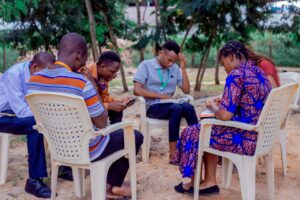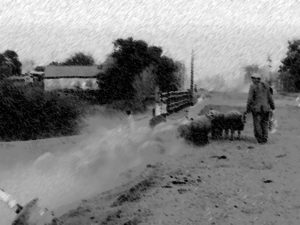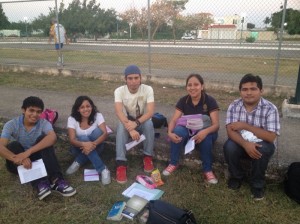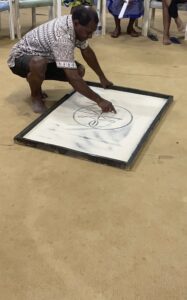Vanuatu is a cluster of islands in the South Pacific and home to the Gud Nius Yunivesiti Felosip (GNYF), our IFES movement. Most of our country is still populated by small, subsistence-farming communities, and only a tiny portion will ever be involved in tertiary education (<1%). Many students will come to university having grown up in churches their whole lives, but still unsure of how to listen carefully to God’s Word and sometimes unclear on exactly who Jesus is or why our love, trust, and knowledge of him is vital. Even at the tertiary level, our students don’t really enjoy sustained engagement with written texts, preferring to hear and talk about what matters.
We wanted to devote a year to intentionally sharing the gospel with our friends and classmates on campus in ways that fit the relational nature of the islands and the strong oral preference in learning, as well as helping people engage with Jesus by piercing through the ‘church background noise’. We decided on a Melanesian version of ‘Uncover’ (a well-received gospel distribution project) called ?Huia Jisas?—Who is Jesus? While this focused mainly on students sharing stories from Mark with other students, we also planned some key public events that would connect our networks with the wider university community in a ‘Vanuatu’ way.
One of the traditional ways of imparting knowledge in Vanuatu is sandroing (or bwatiuli in the Raga language from Pentecost Island). This involves making patterns in the ground with a finger to leave messages, share information, or pass on significant stories. Our idea was to use this local artform to convey the gospel stories we wanted our friends and classmates to hear. We connected with a local bwatiuli expert, Uncle Edgar, to develop four new patterns that reflected four themes from those gospel narratives: sin, forgiveness, reconciliation, and rule.
After a few weeks of reading and discussing the Mark narratives with Uncle Edgar, we presented these new patterns during a special event at our regional university campus. Our staff worker and students told four key stories from Mark, then Uncle Edgar introduced us to a traditional-style story and song he’d composed. It described two people (representing us and God) in a relationship that had broken but been reconciled. As he played the bamboo flute and shared each part of the story, he carefully drew the complex arcs and shapes representing the characters and concepts of what was being told.
As far as we (or Uncle Edgar) know, this is the first time that sandroing has been used in collaboration with and to share the Scriptures. He is excited to take these stories and patterns to his church so that Vanuatu can hear—and see—the good news of Jesus, settled in their hearts and etched in their land.
Tag Archives: evangelistic Bible study
The Beauty of Discovery Bible Study
In TAFES (Tanzanian National Movement), Discovery Bible Study (DBS) is one of the approaches we use, and it has captured the hearts of many students and associates!
We utilise DBS for small group study by following this simple process:
- one member reads the passage and
- the group retells the story (passage), then
- we answer a few main questions together; these are:
- What have I discovered about God?
- What have I discovered about people?
- How do I obey God through this Word?
- Who I am going to tell?
How did it start?
 It was during a staff retreat in February 2021 that our Campus Ministry Coordinator, Sister Joan Wanjiru, proposed trying the DBS method to see if it would be suitable for training students. We used DBS for the first time at that retreat and later in Discipleship
It was during a staff retreat in February 2021 that our Campus Ministry Coordinator, Sister Joan Wanjiru, proposed trying the DBS method to see if it would be suitable for training students. We used DBS for the first time at that retreat and later in Discipleship
Training Seminars (DTS) throughout the country. After the success in 2021, we repeated this study technique during DTS in 2023. Although Inductive Bible Study and Manuscript Bible Study are still in use, DBS has become the most loved and practised approach by many Christian Unions since its introduction.
Uniqueness of DBS:
There’s something special about Discovery Bible Study and its popularity is fostered by these unique advantages:
- Easy to teach and practice. Understanding how to use DBS requires simple training. The discovery questions (above) are easy to remember, making it accessible, even if it’s a person’s first time.
- Importance of application. The practice of DBS is not complete until a person specifically addresses the question of how they will obey the Word that is being studied.
- Tool for evangelism and discipleship. Through DBS, there’s always an increase in the number of people coming to Christ and the growth of members’ spirituality. Using this method of study with a non-believer may draw them to Christ and provides an opportunity for members to tell others about the Word of God.
- Connects people in the group. Since DBS preserves the principle of small groups, participants get to relate to each other beyond just discussing DBS questions.
Jusline C. Nkala, treasurer TAFES KIUT CU:
“It was amazing during DTS 2023 when we used this method to study the book of 1 Samuel. DBS is one of my good and best methods that I have encountered in terms of Bible study because we stay in a group and read the Bible story together, we discover what Scripture says about God and people, and we challenge ourselves to live according to the Word and share the Word with our friends”.
Tumaini Titus
Regional coordinator – TAFES Tanzania
Engaging Seekers in the Word
When Zhenya went to a graduation ceremony in the capital city of her Eurasian home country, she noticed the presence of hundreds of international students.They’d been living there for 5 years and were now about to depart, probably without having heard the gospel…
Her desire to reach them with the good news of Jesus seemed an impossible goal. But 12 years on, thanks to the Lord’s direction and provision, a thriving International Student ministry now exists – including students from other sensitive countries.
At the heart of this ministry are hospitality and the Word of God. I asked Zhenya a few questions so we can hear more:
1. How do you study the Bible with international students?
We now have 25-40 students who cram into a small apartment each week – we make food together, eat, and study the Scriptures. It’s really important that the students feel safe and can ask their questions, debate, and also respectfully disagree in the context of friendship.
For our inductive Bible studies, the passage is printed out in all the languages of the students attending and this makes the Word accessible to everyone. After the main leader has asked questions about the text, we split into small (language-based) groups with student leaders to help facilitate a discussion.
It is very important that we ask questions. The leader must ask good questions that guide everyone through the passage and the students must be able to ask their questions of the text, to discover for themselves what is there, and be challenged to keep looking!
2. Over the years, what have you found to be important when studying the Word with students from different cultural contexts?
I’d say there are three main things:
a. Stories- students learn from stories! We mostly study the Gospels and, sometimes, Old Testament stories about the ‘heroes’. The main task is to allow the text to speak for itself and for students to be introduced to Jesus.
b. Visuals – In a multilingual, multi-cultural environment, it is so important to visualise the story; e.g., videos that illustrate the story, students acting out the passage, drawing pictures, and retelling the story.
c. Good real-world applications: the leaders need to guide students well, drawing on what students have said and helping them to see what the passages mean in their lived experiences.
3. Do you have a testimony of how God’s Word has impacted a particular student?
 ‘Maria’ from a small Muslim country is one example. In her own words, ‘Maria’ thought she already knew the truth, and was curious about her Christian friends who believed wholeheartedly in Jesus. Still believing in her god, she started to discover the truth of Jesus as she attended the Bible studies. But after two years of this, she realised that she believed in one god and was studying about another… and ‘Maria’ knew she couldn’t sit on the fence forever.
‘Maria’ from a small Muslim country is one example. In her own words, ‘Maria’ thought she already knew the truth, and was curious about her Christian friends who believed wholeheartedly in Jesus. Still believing in her god, she started to discover the truth of Jesus as she attended the Bible studies. But after two years of this, she realised that she believed in one god and was studying about another… and ‘Maria’ knew she couldn’t sit on the fence forever.
Week by week, she continued to discover more about Jesus through the Scriptures, until ‘Maria’ reached the point where she started to follow Him.
Reflecting on John 10, she testifies that:
“I was able to hear the Good Shepherd’s voice… and He has guided me to this decision.”
Paula
IFES Associate Secretary for Scripture Engagement
Experiencing Transformation
written by Daniel, a student from Timor Leste
How can we change our old ways of living to that of new ways? Our efforts will not be sufficient to defeat darkness. Even more so if we have memories that will not let us go until we die. I struggled with such memories that haunted me.
As I witnessed fellow friends deciding to follow God fully, I also felt inspired to do so. At the same time, I felt an inner hunger and emptiness; I felt like I was about to drown. One night, I began to desire reading the Word of God. As I walked down the street that night, I reached a crossroad, and I turned in the direction of a staff’s house. I asked him if we can study the Word together and he gladly accepted. Our journey of studying the whole of Luke’s Gospel took us around five months.
Throughout the study I was inspired by the character of Jesus and how people’s lives were changed after encountering him. I saw how Jesus restores dignity in people – like when he healed the blind. I also saw how these people were truly moved by what Jesus did to them. What made a strong impression on me is that Jesus came from above to live a simple life among others. He did not choose to live like a performing magician. I learned that the key to transformation in my life is to have FAITH in Jesus.
Reading Luke’s gospel changed my way of thinking. I understood that life is not just about knowing God in our head but also knowing him in our heart. I learned to open up my life for Jesus to fill me and shine his light in me. I also began to realize that it would be unfair to keep quiet about what the Holy Spirit had done in me.

I started to notice friends around me with the same hunger to read the Word; the topic of life and God kept popping up in our conversations and on social media. So we gladly decided to form a small Bible study group. I have seen changes in my friends – they have new values in life and see life differently than they did in their old ways of living.
As I know Christ more, Jesus is helping to sort through the baggage that I accumulated from my past by sweeping them under the carpet. It is a sweet and painful experience. Although it is a painful, I know Christ is with me and this process is necessary to live a righteous life. It is like an ongoing work in progress with Jesus until the day I meet him. I call this process: “transformation is not just about change but construction”.
testimony translated from Tetun language
The Joy of Studying the Bible with Seekers
I believe that seeker Bible studies are the single most effective way to show Jesus to a friend. God is not a message or a theory, but a person. And this person is made known to us by the gospel stories.
 The Italian context in which I live is characterized by suspicion and skepticism. It surprises me that in this context more seekers than I would have expected are curious to study Bible passages in a safe place with other fellow seekers. And when they come, oh, it is fascinating to see their reactions: “My first impression was shocking: I discovered in the Bible a marvelous figure, so human when angry and indignant in the face of unbelief and hypocrisy, and so divine in speaking with an authority never seen before… and even able to forgive his persecutors!’” says Gianluca, a medicine student.
The Italian context in which I live is characterized by suspicion and skepticism. It surprises me that in this context more seekers than I would have expected are curious to study Bible passages in a safe place with other fellow seekers. And when they come, oh, it is fascinating to see their reactions: “My first impression was shocking: I discovered in the Bible a marvelous figure, so human when angry and indignant in the face of unbelief and hypocrisy, and so divine in speaking with an authority never seen before… and even able to forgive his persecutors!’” says Gianluca, a medicine student.
Over and over again, I’ve witnessed how in studies like these, people get so much into the story that Jesus himself seems to jump out of the pages. They see Jesus, they see God. They are so shocked by his actions and struck by his words that they become hungry for more. As the weeks go by, and as they discover different aspects of this fascinating Nazarene, some cannot respond otherwise than with a decision to follow him.
When the first person in the group decides to do so, it’s amazing. The others see the life of someone who was sitting next to them in the previous weeks (‘one of their own’) transformed – just like the people they have been reading about in the gospels. The new believer becomes the most powerful witness within the Bible study group.
“It is real. It is not a fairy tale. Something happened to me that I still cannot fully understand, but I know that it is real” says Viviana, a business student. This is so intriguing that sometimes others in the group will want to experience the same thing. I had the joy of seeing almost entire groups of seekers become followers of Christ.
This is the power of God working through people who have met him in his Word. The Word did become flesh, and he is living among us today. He is waiting for our faithfulness and boldness in inviting our friends to find the living God through the gospel stories.
sarahbreuel (at) gbu.it
Surprised by Jesus
I used to believe that the Bible is an old book that nobody reads. But then in October 2012, I met José, a Christian graduate who became a good friend. One day we started talking about the Bible. For me, this was a very sensitive topic. I thought that you had to avoid talking about politics and religion if you want to have a good relationship with others.
Then José invited me to a COMPA Bible study. I came away with more questions and doubts than before. José had given me a Bible, but I did not know how to read it. So, I asked him to teach me. He agreed and in the following week, we had our first official Bible study.
The approach which COMPA Mexico used to study the Bible was similar to the study technique which I used in science. This attracted me. I was surprised to realize that it is possible to take a rational approach to the Bible.
I was even more surprised by the person of Jesus. I discovered a new face of Jesus; I met a different Jesus. Previously, I thought that Jesus was one of many smart people in the history of our world – the smartest in his time. But I did not know that he has a big heart full of love. I used to think that Jesus was just a human being, but discovered that he is God.
 Reading John 1 was particularly significant for me. When I first read this passage, I was very confused: How can Jesus be God? How can he be both a person like me and fully God? These questions made me want to investigate more.
Reading John 1 was particularly significant for me. When I first read this passage, I was very confused: How can Jesus be God? How can he be both a person like me and fully God? These questions made me want to investigate more.
As I got to know Jesus better through other biblical stories, I started to understand. My vision of the world changed and I started to believe in a personal God. I became aware of my sin and the darkness in me. And what is most important: I met the love of God through the grace and hope which he gives us in Jesus.
I’m a scientific person. I want to be sure of something before I believe in it. If somebody had shown me a miracle, I don’t think that I would have believed. But I love to read; I love words. Jesus came into my life through his Word. I discovered that all the evidence necessary to believe in Jesus is there in the Bible, the Word of God. Early 2014, I started a Bible study group in my own school (see picture).
Sara Medina, student of chemistry and physics in Mexico
(sara.medinagom (at) gmail.com)
Uncover – Introducing your Friends to Jesus
They say that the best ideas are often the simplest ones. Uncover is a simple idea – an attractively designed Bible study resource with a series of six evangelistic studies in Luke’s gospel. This booklet can be used in small groups or more informally in one-to-one meetings.

After an initial training phase, the IFES movement in Great Britain (UCCF) challenged all of their core student members to read Luke’s gospel with at least five of their non-Christian friends.
Sam Hardy dared to take up this challenge: ‘I shyly asked my flatmate to do the Uncover study with me and he thoroughly enjoyed it. He has since become a Christian.’
Ed was invited to an Uncover Bible study by his Christian friend Jonno. He shares: ‘I found it interesting to look at the gospel in depth with someone who knew more about it. The more I read, the more I wondered if it were true. Jesus was always able to answer people’s questions and loved them. He was an incredible character.’ As Ed continued to investigate, he was drawn to Jesus and became a Christian.
Many similar stories could be told. All of this is taking place in a post-Christian context which means that many students have little or no understanding of who Jesus is and what Christians believe. A negative attitude towards faith is common. Uncover invites these students to examine the evidence about the life and purpose of Jesus using Luke’s gospel – to uncover for themselves who he is. Instead of expecting the students to come to Christian meetings, the gospel is taken to them: in the coffee shop, in their flat or wherever.
The response to Uncover has been amazing. Students have grasped the vision like we have never seen with any past gospel project. They have found new confidence to invite their friends to meet Jesus in the gospel. Since we started this project in 2011, thousands of non-believers have been reading Luke with their Christian friends; hundreds have come to faith. God’s Word is still powerful to draw students to Jesus today – in any and every context!
It has been encouraging to see that a number of other IFES movements in Europe have been inspired by Uncover. Some have translated the material for use in their own context.
For more information on Uncover, see: http://www.uccf.org.uk/uncover/.
Pod Bhogal (PBhogal (at) uccf.org.uk)
Head of Communications, UCCF
The Unexpected Result of Reading Scripture. A Testimony.
Although my parents were atheists they still considered themselves Muslims. I became a Muslim after the Soviet Union collapsed and religion was allowed. Some relatives told me that I was becoming more and more like a fanatic.
But then my sister accepted Jesus as her Savior. When she told us about her decision we all stood against her. It was such a shame for our Muslim family! We put pressure on her and once I even hit her. While I was away in the army, my sister became more mature and bold in her faith. When I came back, I was surprised at how confidently my sister shared about Jesus, but her words meant nothing to me. For me she was a betrayer.
One day my sister invited me to free English courses. I understood immediately that the people offering these courses were probably missionaries, but I didn’t care. I wanted to learn English so that I could find a good job or immigrate for a better life in the West. After the English lessons, we were invited to stay on for Bible studies. After a while, I started staying and we would often argue: I argued that Jesus is only a prophet; they were convinced he is God. One thing that shocked me was their love. Sometimes I would behave very rudely, but I always felt accepted.
A year after visiting this group regularly, I decided to read the gospel. I wanted to prove to those “lost and deceived Christians” that Jesus is not a God, but only a prophet. So I started reading and could not help enjoying it. Every day I would run back home after work to continue reading. Everything was great until I read John 14:6 “I am the way and the truth and the life. No-one comes to the Father except through me.” I was shocked by this statement: “nobody”??? What about Muslims? What should I then do? I wished Jesus would not say that…
I understood that I needed to make a decision. My first prayer to Jesus was, “Jesus, if you are really a God, let me know that and I will follow you.” Some time passed and I felt unusual peace like never before. I accepted Jesus as my Savior. I didn’t tell anyone for about two months. When I shared this news with my sister, she happily said, “I knew it would happen, I was praying for you all these years!” This happened in 2001 and since then I have walked with the Lord.
The author is involved in IFES ministry as a volunteer
How can they believe?
How can they believe in the one of whom they have not heard? (Rom. 10:14)
Before becoming a Christian, I really felt that my life didn’t have any meaning. I was searching for myself, my identity; I didn’t know what to do with my life, and most of all, I was afraid. I didn’t have self-confidence, and I almost always felt excluded and rejected. And then, I simply had to grow up. In order to grow up you must know what you want, find a meaning in life. I didn’t find any and was constantly changing my mind about which studies and future profession to pursue.
Just a few months ago, I could not have imagined a God who rules the universe and that my will could be under the control of a higher being. I felt condemned to live without any guidance and believed that after death there’s nothing. I had vaguely been told about God when I was younger, but so vaguely that I did not know Jesus. I concluded that God was too far away and abstract and that he couldn’t exist. I had totally rejected the idea of believing in him. How should one believe in this distant and obscure figure if one has never been in contact with him, and if there’s no proof of his existence? I simply did not understand this idea of faith, and anyway I’d never opened a Bible in my life. For me, it was an intimidating and austere book.
But this has changed. I’ve been studying English at the university in Paris for the past three years, and last year, I took a course titled: “The Bible in English literature”. That year I started going to the local IFES group (Groupes Bibliques Universitaires in France). A friend of mine had told me about it, and explained that the Bible was studied there. I went because I wanted to learn more about this book I knew nothing about, particularly in view of my university course.
It’s one of the best things that ever happened to me. First, because the people I met there are now dear friends, but also because that is where I heard about Jesus for the first time. I felt right at home after only a few weeks, but I did not yet believe in God.
For that to happen, I had to attend a weekend organized by IFES in February 2011. That’s when I truly realized that God was the missing piece in my life. I think that knowing Jesus more and more through the IFES’s Bible studies is what helped me most to step out to God in faith and to finally believe in Him.
Sophie , French student




